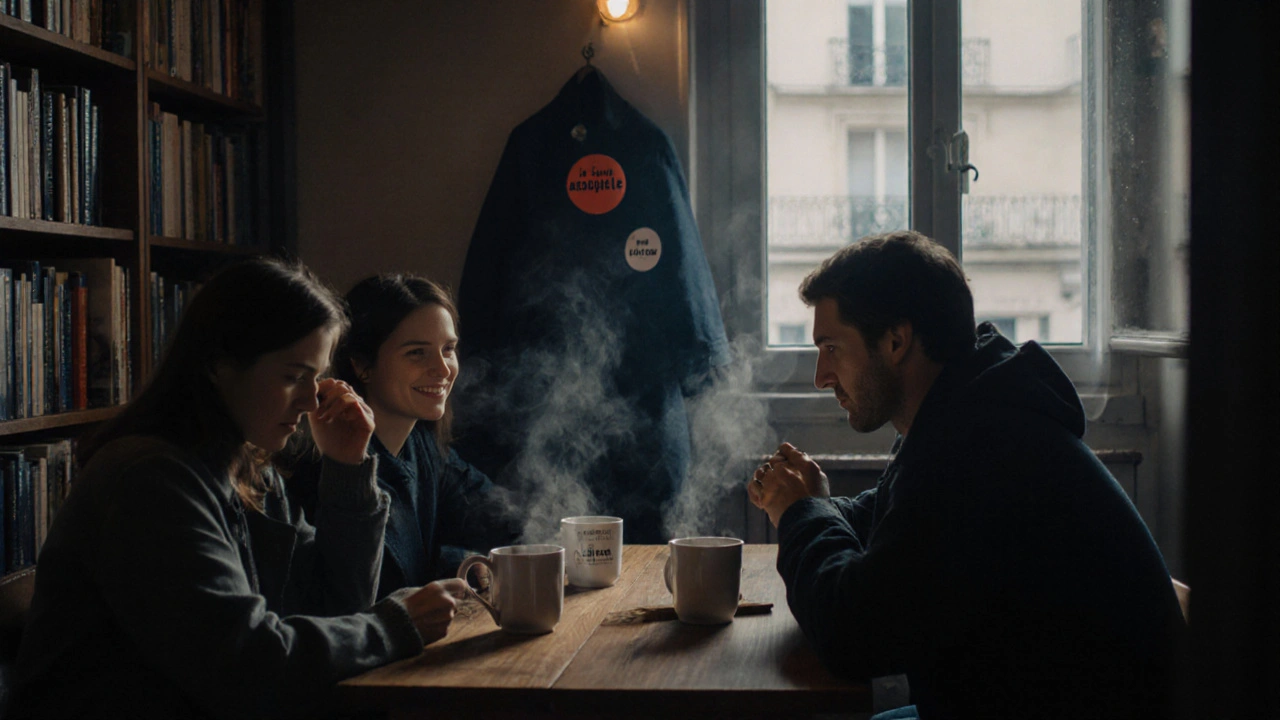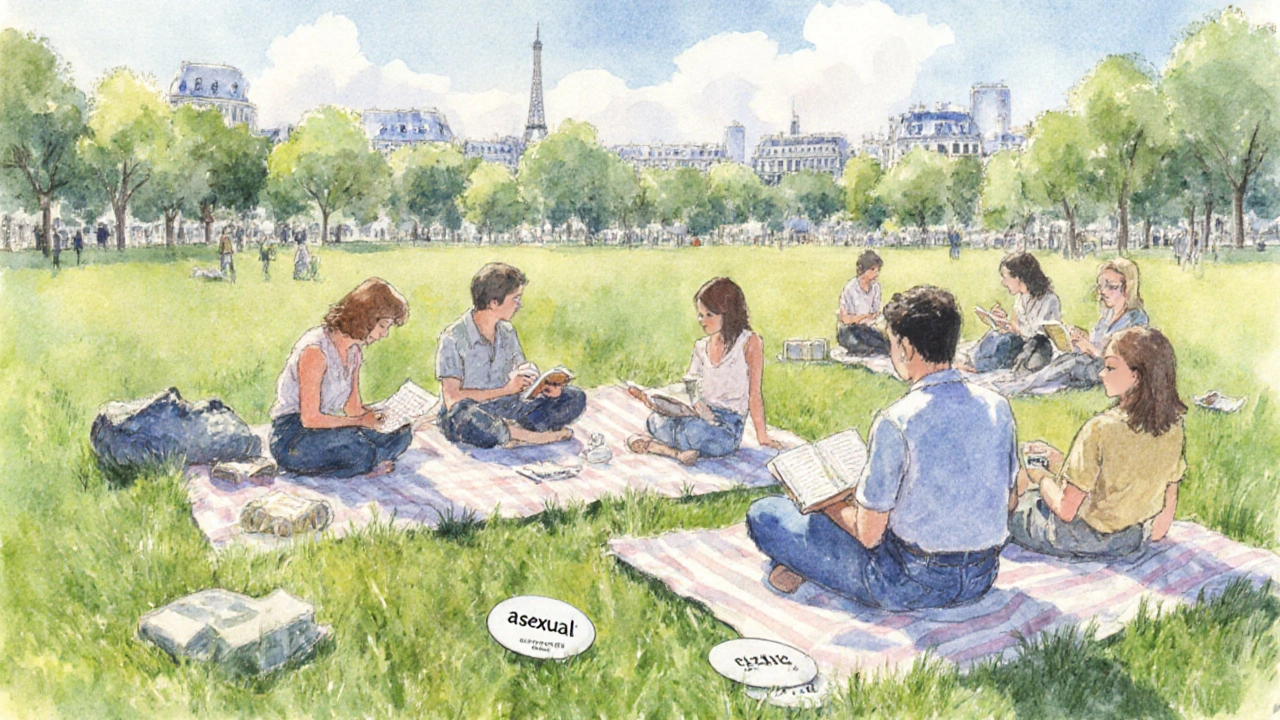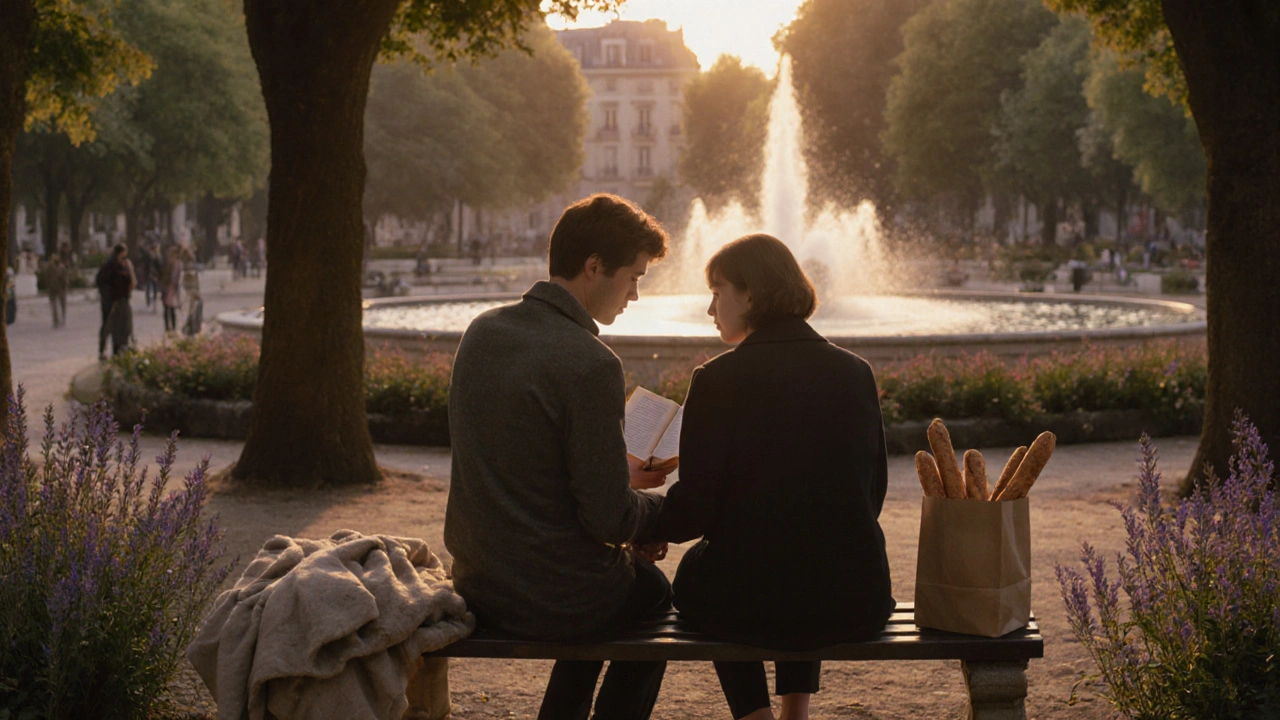In Paris, where cafés hum with quiet conversations and the Seine reflects the glow of streetlights, a quiet revolution is unfolding-not in the streets of Montmartre or the galleries of the Louvre, but in the private spaces where people begin to name what they’ve always felt but never had a word for: asexuality. For many in the city, this isn’t about rejecting intimacy-it’s about redefining it on their own terms. In Paris, where romance is often painted as the default human experience, discovering you don’t experience sexual attraction can feel isolating. But you’re not alone. And the asexual community here is growing, quietly, confidently, and with deep roots in local culture.
What Asexuality Really Means (And What It Doesn’t)
Asexuality isn’t a phase, a trauma response, or a lack of experience. It’s a sexual orientation where a person doesn’t experience sexual attraction to others. That’s it. It doesn’t mean you don’t feel love, form deep bonds, or enjoy physical closeness. Many asexual people in Paris have long-term partnerships, kiss their partners goodnight, hold hands walking through Jardin du Luxembourg, or even marry. But the spark of sexual desire? It’s simply not there. And that’s okay.
Think of it like being left-handed in a right-handed world. Everyone assumes you’ll shake hands the same way, eat with the same fork, feel the same pull toward romance movies and dating apps. But you don’t. And that doesn’t make you broken-it makes you different. In Paris, where the idea of "amour" is almost sacred, this difference can be hard to explain. You might hear, "But you’ve never met the right person," or "You’re just shy." Those phrases come from good intentions, but they miss the point.
The Asexual Community in Paris: Where to Find Your People
For years, asexual people in France had nowhere to turn. No major organizations, no public events, no media representation. That’s changed. In 2023, the first official asexual meetup group in Paris launched at La Maison des Associations in the 18th arrondissement. Every third Thursday, people gather in a quiet room above a bookstore near Place de Clichy. No pressure to date. No expectations to perform. Just coffee, silence, and sometimes, tears of relief.
There’s also an active Discord server called "Asexuel·le·s Paris" with over 1,200 members. It’s mostly French speakers, but expats from London, Berlin, and Montreal join too. People share stories about coming out to their families in Lyon, navigating workplace assumptions in Marseille, or finally understanding why they felt out of place at a Valentine’s dinner in Saint-Germain-des-Prés.
And then there’s the annual Paris Asexual Pride, held every June in the 10th arrondissement. It’s not a parade with floats. It’s a picnic in Parc de la Villette. People bring sandwiches, blankets, and books. Some wear pins that say "Je suis asexuel·le"-I am asexual. Others don’t wear anything at all. The point isn’t visibility for others. It’s peace for themselves.
How French Culture Shapes the Experience
France has a complicated relationship with sexuality. On one hand, it celebrates eroticism in art, literature, and film. On the other, it expects everyone to fit into a romantic mold. The French media rarely talks about asexuality. Even in progressive circles, the assumption is that if you’re single past 30, you’re just not trying hard enough.
But change is happening. In 2024, the French NGO Lesbisches et Asexuel·le·s Ensemble (LAE) published a guide for schools called "L’Amour Ne Se Voit Pas Toujours"-Love Isn’t Always Visible. It’s now used in 12 lycées across Paris, including Lycée Henri-IV and Lycée Louis-le-Grand. Teachers use it to explain that attraction comes in many forms. A student might say, "I like my best friend a lot, but I don’t want to kiss them." That’s not confusion. That’s asexuality.
Even dating apps are catching on. OkCupid now includes an "asexual" option in its orientation menu in France. So does Hinge and Bumble. You can now write "I’m asexual" in your bio without fear of being mocked. In Paris, where dating apps are part of daily life, that small change matters.

The Spectrum: It’s Not Just "Asexual"
Asexuality isn’t one thing. It’s a spectrum. Some people feel no sexual attraction at all-those are often called "gray-asexual" or "demisexual." Demisexual people in Paris might feel sexual attraction only after forming a deep emotional bond. They might fall in love slowly, over months of long walks along the Canal Saint-Martin, quiet dinners in Belleville, or shared silence in a bookshop in Le Marais.
Others might feel sexual attraction but don’t want to act on it. That’s called "sex-repulsed." Some feel neutral-"sex-indifferent." And some are curious but unsure. All of it is valid. There’s no checklist. No test. No "correct" way to be asexual.
In Paris, the community avoids rigid labels. You won’t hear people say, "I’m 100% asexual." You’ll hear, "I’m still figuring it out," or "I don’t need a label to feel okay." That’s the French way-nuanced, thoughtful, patient.
Coming Out in France: What Works
Coming out as asexual in France can be harder than coming out as gay. Why? Because no one believes it exists. Parents might say, "You’ll change when you meet someone." Bosses might assume you’re cold or uninterested in team bonding. Friends might joke, "So you’re a robot?"
Here’s what helps:
- Start with a book. Give them "The Invisible Orientation" by Julie Sondra Decker-it’s been translated into French and is available at Librairie Galignani on Rue de Rivoli.
- Use examples they know. "Think of how you feel about your favorite food. You love it, but you don’t want to kiss it. That’s how I feel about sex."
- Point to culture. "Even in French cinema, there are characters who don’t have sex and still live full lives-like the woman in Amélie who finds joy in small moments, not romance."
- Give time. French families often need months to adjust. Don’t expect instant understanding.
And if you’re afraid? You don’t have to tell anyone. Not yet. Paris has many quiet corners where you can be yourself without explanation. The benches near the Musée d’Orsay. The rooftop garden of La Cité de la Mode et du Design. The 24-hour pharmacy on Rue de la Gare in the 13th arrondissement, where you can buy tea and sit alone without being asked why.

Love Without Sex: Relationships in Paris
Asexual people in Paris have relationships. Real ones. Deep ones. They go to the opera together. They cook ratatouille on Sunday nights. They argue about which arrondissement has the best baguette. One couple met at a poetry reading in Saint-Michel and have been together for 11 years. They don’t have sex. They hold each other while watching Amélie for the 17th time.
Some asexual people in Paris are in open relationships. Others are single. Some live with roommates. Others live alone. There’s no single path. The only rule? Honesty. With yourself. With your partner. With the world.
Therapists in Paris are slowly catching up. Le Centre de Psychologie du Corps in the 6th arrondissement now offers asexuality-informed counseling. They don’t try to "fix" you. They help you understand your boundaries, your needs, your language.
Why This Matters in Paris-And Everywhere
Understanding asexuality isn’t just about one group of people. It’s about breaking the myth that everyone wants sex, that love must include it, that desire is the only path to connection. In Paris, where romance is a religion, that’s radical.
When you stop assuming everyone feels the same way, you make space for more kinds of love. More kinds of families. More kinds of peace.
You might not be asexual. But maybe someone you know is. Maybe you’ve sat next to them on the metro, shared a bottle of wine at a bistro in the 11th, or walked past them in the Jardin des Plantes. They might never say it out loud. But if you learn to listen-not to what they say, but to what they don’t-you might just see them more clearly.
And that’s the real Parisian gift: seeing the quiet beauty in what others overlook.
Is asexuality the same as being celibate?
No. Celibacy is a choice to not have sex, often for religious, cultural, or personal reasons. Asexuality is an orientation-you don’t experience sexual attraction. You might choose celibacy, or you might not. But the lack of attraction is the core of asexuality, not the behavior.
Can asexual people fall in love?
Yes. Love and sexual attraction are separate. Many asexual people form deep romantic bonds. They might call themselves "romantic asexuals." They hold hands, write letters, plan trips to Normandy or Provence, and feel profound emotional connection. Sex isn’t required for love.
Is asexuality rare in France?
Not really. Studies estimate that about 1% of the population is asexual. That’s around 670,000 people in France. Most have never heard the word. That doesn’t mean they’re rare-it means they’re invisible. The community is growing because more people are finding the language to describe what they’ve always felt.
Are there asexual events in Paris besides Pride?
Yes. Monthly "Asexual Book Circles" meet at La Médiathèque de la Villette. There’s also a quarterly film night showing movies with asexual characters, like My Life as a Zucchini or Portrait of a Lady on Fire. These aren’t loud events-they’re calm, thoughtful gatherings, just like Paris itself.
What if I think I might be asexual, but I’m not sure?
That’s completely normal. Many people spend years wondering. Try journaling: When you see someone attractive, do you feel a pull to be with them sexually? Or just to know them, talk to them, be near them? There’s no rush. You don’t need to label yourself. Just be honest with yourself. Paris has space for that.

